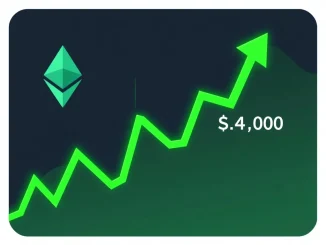
The world of cryptocurrency is no stranger to controversy and scrutiny, and the latest involves prominent figure CZ, the former CEO of Binance. A recent WSJ report has sparked a heated public exchange, with Changpeng Zhao directly refuting its claims and labeling the article as a targeted attack.
What Did the WSJ Report Allege?
The Wall Street Journal published an article that reportedly linked CZ to a crypto venture called World Liberty Financial (WLFI). The report specifically mentioned Steve Witkoff, a figure with ties to the Trump administration, and his son Zach Witkoff. The core allegations, according to CZ’s account, were:
- Steve Witkoff and his son Zach were promoting WLFI in the Middle East.
- Changpeng Zhao was purportedly serving as a ‘facilitator’ in some capacity for this venture.
These allegations suggest a connection between a major crypto figure like CZ and a political/business figure tied to a former US administration through a crypto project.
CZ’s Strong Rejection of the Report
In response to the published article, CZ took to platform X (formerly Twitter) to issue a firm denial. He stated that the WSJ had sent him a list of questions prior to publication, which he described as containing “wrong and negative assumptions.” CZ explicitly denied these assumptions.
Despite his clear rebuttal provided to the journalists, the article was published containing the information he had denied. This led to his public statement where he didn’t just deny the specifics but questioned the very intent behind the reporting.
An ‘Attack’ on Crypto Leaders?
Beyond simply refuting the facts, CZ offered a strong opinion on the motivation behind the WSJ report. He argued that when a story is built on “negative intentions to begin with,” attempts to correct inaccuracies before publication are futile because the narrative is already set.
He went further, accusing the Wall Street Journal of acting as a “mouthpiece” for certain forces within the U.S. CZ believes these forces are actively seeking to “attack crypto, global crypto leaders, and the pro-crypto administration” (referring presumably to any administration perceived as favorable to crypto). This suggests CZ sees the report not just as inaccurate journalism but as part of a broader campaign against the digital asset space and those who lead it.
Why Does This Matter for Binance and Crypto?
While CZ has stepped down as CEO, his influence as the founder of Binance and a major voice in the industry remains significant. Any report linking him to potentially controversial ventures or political figures can attract considerable attention and speculation.
This incident highlights the ongoing tension between traditional media, regulatory bodies, and the often-disruptive world of cryptocurrency. Reports from established financial news outlets like the WSJ carry weight, even when disputed. For crypto leaders, navigating this landscape involves not only building technology and businesses but also managing public perception and responding to scrutiny.
Navigating Media Scrutiny
The exchange between Changpeng Zhao and the Wall Street Journal provides a case study in how figures in the crypto space interact with established media. Key takeaways include:
- Pre-publication Engagement: CZ notes he was contacted and provided denials, highlighting the process, but also the outcome where his denials didn’t prevent publication.
- Public Rebuttal: Using social media platforms like X allows crypto figures to directly address their audience and counter narratives presented in traditional media.
- Framing the Narrative: CZ framed the report as an ‘attack,’ attempting to shift the focus from the allegations themselves to the perceived motives of the publisher and other external forces.
This dynamic is likely to continue as the crypto industry matures and faces increasing attention from regulators and the press.
Conclusion: A Clash of Narratives
The dispute between CZ and the WSJ report is more than just a disagreement over facts; it’s a clash of narratives regarding the crypto industry and its key players. CZ vehemently denies the report’s specific claims and views it through the lens of a broader effort to undermine crypto and its crypto leaders. As the space evolves, such confrontations with traditional institutions and media are likely to remain a significant aspect of the crypto landscape, underscoring the challenges of building trust and navigating complex relationships.



